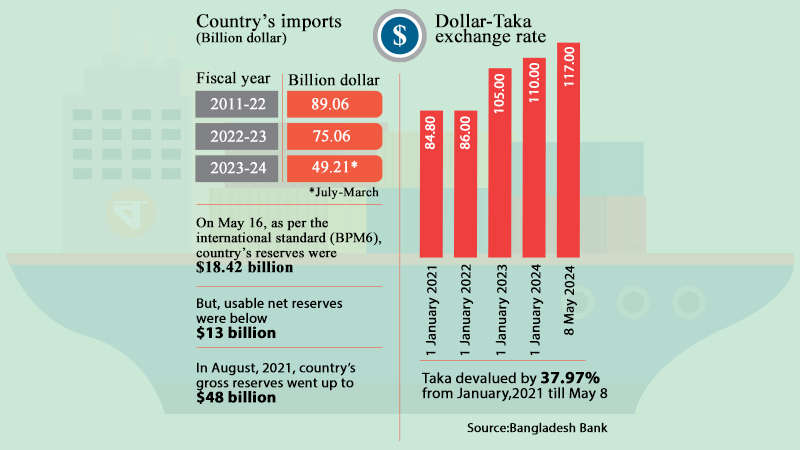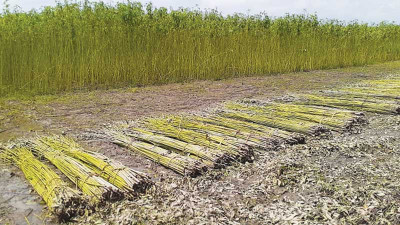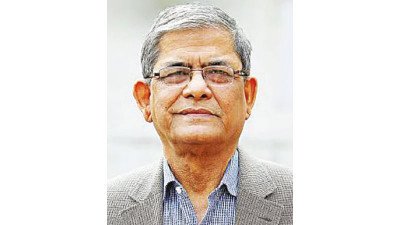 Bonik Barta graph
Bonik Barta graph A big name in the country’s power sector was in talks to get financing
from a foreign entity. When the process was nearly final, the news spread that
Bangladesh’s usable foreign exchange reserves came down below $13 billion. The
foreign organization declined to finance due to this development. “The reserves
of Bangladesh are now at risk. This is why we do not want to take the risk of
financing a Bangladeshi company,” informed the foreign firm. But, the local
power company received a larger amount in the past from this very overseas
entity.
Bangladesh Bank has been talking for last two years about undertaking
different measures to stop the country’s reserves sliding to a risky situation.
First step was taken to control the imports. The import cost went down by
nearly $14 billion in last fiscal year (2022-23) as compared to previous
2021-22 fiscal. Imports could go down in the ongoing fiscal (2023-24) by $25
billion as compared to 2021-22 fiscal year. Based on this calculation, if the
import cost of 2021-21 fiscal is considered as the base then the cost of import
in the current fiscal will fall by $40 billion. The figure stands at nearly $25
billion if the net import cost reduction in these two fiscal years is taken
into consideration.
Aside from the controlling imports, taka was devalued about 38
percent against dollar in last three years. ‘Crawling peg’ system was
introduced recently to determine the exchange rates. A system was introduced to
allow the banks to exchange taka and dollar. To reduce the pressure on dollar,
it was announced that transactions would take place in rupee, yuan and ruble. A
loan agreement was signed with the International Monetary Fund (IMF) for $4.7
billion. While taking every initiative, the central bank claimed that the
erosion of foreign exchange reserves will stop. Not only that the reserves would
go up.
According to Bangladesh Bank’s own method of calculation, as
of May 16, the gross reserves of the country stood at $23.9 billion. But, as
per the international standard (BPM6), country’s reserves on that day were
$18.42 billion. Aside from these two methods, Bangladesh Bank uses another
method. According to that method used to inform IMF, Bangladesh’s usable net
reserves are now below $13 billion. In August, 2021, country’s gross reserves
went up to $48 billion.
Convention dictates that a country should have reserves enough
to meet the import bills for at least three months. At present, the country has
to repay $5 billion every month for imports. That means with the reserves the
country has it is not possible to repay import bills for three months. This
condition is regarded as risky for any country.
Former Bangladesh Bank Chief Economist Birupaksha Paul believes
that erosion of reserves and high inflation are the results of wasting time by the
central bank in formulating policy, instability and lack of cordiality. “The
exchange rates of dollar should have been coordinated with the market long time
ago. Time was wasted in doing that. This resulted in a big illegal hundi market
in the country. Even for imports, people now look for those who are engaged in
hundi business. Inflation was promoted by restricting interest rates. There was
a significant delay in leaving interest rates to the market. Bangladesh Bank
was not cordial in both cases. This is why sliding of reserves and high
inflation became a long-term problem,” he told Bonik Barta.
Bangladesh Bank data show that imports of the country in
2019-20 shrank 8.56 percent due to Covid-19. Despite that Bangladesh imported
products worth 54.78 billion. The imports went up to $65.59 billion in 2020-21.
Country’s imports went up to $89.16 billion in 2021-22, an increase of nearly
36 percent. Record amount of import bills put pressure on the country’s reserves.
This led Bangladesh Bank to be proactive at the beginning of 2022-23 fiscal in
controlling imports. Owing to dollar crisis and different conditions, the
imports in 2022-23 fiscal came down to $75.06 billion. In the first nine months
(July-March) of the current fiscal (2023-24), the country imported products
worth $49.21 billion. At the end of this fiscal year, imports could go up to
$65 billion if the repayment is $5 billion every month. This shows that the
import cost will decrease by $25 billion as compared to 2021-22 fiscal. Import
cost in last two fiscal years fell by nearly $40 billion.
Although repayment of import cost is mandatory, the country is
not receiving export earnings at right time. According to Export Promotion
Bureau (EPB), Bangladesh exported product worth $47.47 billion in first ten
months (July-April) of the current fiscal. In 2022-22 fiscal, products worth
$55.55 billion were exported. The central bank’s statistics show that unreturned
export earnings in first nine months of the current fiscal alone stood at
$12.48 billion. This unreturned amount was shown as net trade credit in the balance
of payment.
In order to increase the reserves, Bangladesh Bank introduced
currency swap arrangement in February. Under the system, commercial banks were
allowed to take out taka depositing dollar with the central bank. This
arrangement also failed to increase the reserves of the country.
On July 11, 2023, Bangladesh-India bilateral trade began in
rupee with the hope to reduce the pressure on dollar. This allows Bangladeshi
banks, for the time being, to open letters of credit (LC) in rupee. On February
4, Bangladesh Bank allowed to transact in Chinese yuan through Real-Time Gross
Settlement (RTGS) system. And, announcement was made for the beginning of trade
with Russia in ruble. None of these could be popular and pressure on dollar has
not reduced.
When approached, Economist Dr Ahsan H Mansur said, “We do not
earn in rupee, yuan or ruble. We earn in dollar. Our trade deficit with India
and China is over 90 percent. How can this system be popular if we do not have
rupee or yuan?”
“Many initiatives were taken on behalf of Bangladesh Bank to
face the dollar crisis and stop reserve erosion. But, time was wasted in doing
so. As a result, expected results did not come by. Interest rates and exchange
rates should be left to the market to ensure complete stability,” he said.
Bangladesh Bank Spokesperson Mezbaul Haque, however, claimed
that the central bank took all the decisions at the right time in the interest
of country’s economy. “Exchange rates of dollar have been adjusted with the
market through introduction of crawling peg system. The transactions on inter-bank
foreign exchanges have increased due to this. Remittance flow this month is
also good. Export earnings will go up with the increase of exchange rates. An
increased supply of dollar in the market will reduce the pressure on foreign
exchange reserves,” he told Bonik Barta.







